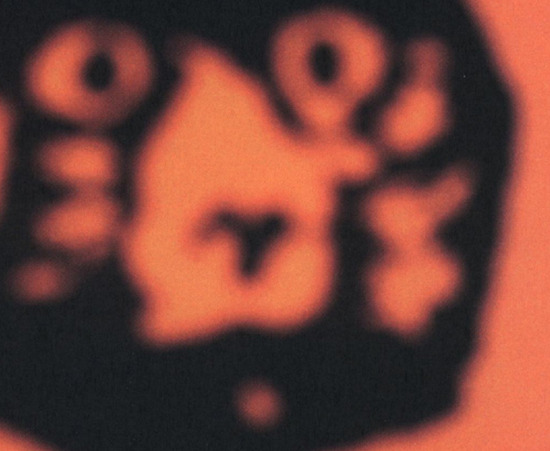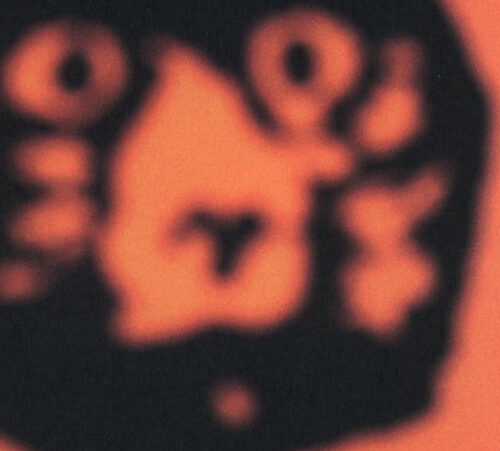Monster arrived in the autumn of 1994 in a garish orange bubble of hype. REM, those bookish purveyors of earth-toned jangle and ruminative chamber-folk, had gone grunge! Mandolins were out, Marshall stacks were in. This album, their ninth, was going to be "foxy, in-your-face, punk rock, trashed and stupid". Alright! Monster was my first new REM album. I was 13 and getting into alternative rock via hissy C90s a friend had copied off his older brother, our central Scottish school’s resident grebo. Monster fitted into that context nicely, and had the bonus of appealing to rocker friends who thought REM had always been a bit wussy.
Twenty years and innumerable hours of horrible noise later, I hear Monster rather differently. Grunge it ain’t: there’s no trace of metal here and not much punk. For a rock album, it doesn’t really rock. It’s loud, but rarely abandoned. Peter Buck’s guitars, painted in several shades of distortion, dominate the mix, with Bill Berry’s dry drums sitting below. Despite the basic tracks being recorded live, there’s a curious dislocation between the rhythm section and the roaring guitars. The guitars sound great, but the energy generated on that Los Angeles soundstage is not always conveyed to the listener. The result is some kind of post-modern exercise in rock, "rock in inverted commas" as Buck perceptively put it. Buck, a guitarist who followed the Ramones model of waiting four albums before delivering a solo, approaches his leads on Monster with an arched eyebrow. Grok that ingenious backwards solo on ‘What’s The Frequency Kenneth’; ecstatic rock release turning itself inside out.
This strategy seems all the more deliberate when you consider Michael Stipe’s lyrics. Monster is an album which plays on themes of artifice and authenticity. "We all invent ourselves" sings Michael Stipe on ‘Crush With Eyeliner’. "I’m the real thing" adds Thurston Moore in a sardonic drawl. Ironically, the song which most explicitly mocks corporate rock – ‘King of Comedy’ – is the most artificial sounding of all, a sarcastic electro-rock romp built on a booming drum loop. "I’m not commodity" protest Stipe and his Hollywood pals in the song’s coda, their cod-soulful chorus dripping in irony.
In its obsession with surface and pose, Monster is REM’s glam album. There’s a nod to the New York Dolls – "I’ll be your Frankenstein" leers Stipe on ‘Crush With Eyeliner’ – and the ironic mea culpa of ‘I wanna be Iggy Pop, if that’s what it takes’ in ‘I Took Your Name’. But there’s little of Iggy or the Dolls’ glittery raunch. Monster is full of sex, but it’s rarely sexy. There’s creepy sex, desperate sex, precious little tenderness. The horny protagonist of ‘I Don’t Sleep I Dream’ is unapologetic about his desires: "I’d settle for a cup of coffee, but you know what I really need". Uninterested in any deeper human connection, this character prefers to live in his dreams, the sex being a purely physical release. The (s)exception is the closing track ‘You’, an oddly powerful piece of sci-fi eroticism, with Buck’s layered guitars uncoiling around the red sodium light throb of Mill’s tremolo bass. "You wipe my lips, you turn me on" sings Stipe. "Let me hold your syrup close to mine", he croons. Is this the consummation of his ‘Crush With Eyeliner’? Ending in the hum and scrape of amp noise, ‘You’ sees the cyborg Frankenstein’s monster from that song find its post-human soul.
With its falsetto vocal and 70s soul arrangement, ‘Tongue’ sets itself up as a sensuous slink into lava-lamp eroticism, only for Stipe to undermine it all with the most brutal lyric of his career: "Call my name, here I come, your last ditch lay, will I never learn?" It’s a desperately sad song, its "ugly girl" protagonist resigned to grim sex with some unsympathetic prick: "You want a room with a fire escape, I wanna tell you how much I hate this". Stipe described the song as a hybrid of Prince and Tori Amos, and in some way it anticipates Amos’s feminist detournements of macho songs on Strange Little Girls, taking the dirty, consequence free sex of Prince’s cheekiest songs into darker territory.
Monster is full of such bullies and creeps: ‘What’s The Frequency Kenneth?’ takes its title from the words of a deranged fan who attacked the TV news anchor Dan Rather, while ‘Star 69’ presents a character obsessed with his own phone stalker. ‘Circus Envy’ sees Stipe’s pencil-necked nerd seethe at the bully who put pepper in his coffee and kicks sand in his breakfast cereal bowl, while Buck’s ravaged fuzztone gnaws away at the song like an anxiety headache. ‘Bang and Blame’, meanwhile, is a jeering riposte to a cruel lover: "If you could see yourself now baby, the tables have turned…"
In its embrace of irony and trash Monster poses as the antithesis of the sombre and soulful Automatic For The People. One could even read ‘Strange Currencies’ as a knowing answer to ‘Everybody Hurts’, so shameless is its reworking of the same chiming chord sequence. Stipe’s plea for "a chance, a second chance, a third chance, a fourth chance" comes across as just a little too desperate for the song to sit comfortably as a sincere romantic ballad. In the chorus, love song cliches are placed in quotation marks, as if the protagonist is trying to say all the right things, but coming across as obsessive: "These words: ‘you will be mine’" urges Stipe over Mike Mills’ swelling Hammond chords. As that refrain leads into the middle eight, Stipe adds an impassioned "all the time". Where’s the restraining order already?
Perhaps this reading is too cynical; couldn’t it just be a genuine attempt at a radio-friendly ballad, transcending its cliches through sheer conviction? Later in their career REM would make such songs to order, resulting in drippy duds like ‘I’ll Take The Rain’, but ‘Strange Currencies’ is more interesting than those. REM have often been seen as rather earnest, but Stipe’s lyrics in this era revel in ambiguity. With this is mind, Monster has more in common with Automatic than it might first appear. The bleak ‘Drive’, with its sarcastic lift of David Essex’s ‘Rock On’ ("Hey kids, rock ‘n roll"), the sinister murder ballad ‘Sweetness Follows’, ‘Monty Got a Raw Deal’s’ Lynchian vision of faded Hollywood stars: these songs all anticipate the themes of Monster.
Automatic is often described as a death album, but its tone is seldom mournful, with Stipe exploring a range of emotions around the theme of loss. Monster‘s death song, ‘Let Me In’, is much rawer, as Stipe tries to come to terms with his friend Kurt Cobain’s suicide. "I had a mind to try to stop you," he sings, "Well I got tar on my feet and I can see all the birds look down and laugh at me, clumsy crawling out of my skin". Musically, it’s a complete departure for REM, with Mills’ heavily processed guitar floating somewhere between shoegaze white out and the icy wash of black metal while Buck adds a high and lonesome Farfisa organ line. Bleakly beautiful, ‘Let Me In’ is the album’s masterpiece.
Unlike its rightly feted predecessor, Monster is no classic, but it is one of REM’s most interesting albums, making a virtue of its artifice. Studio-bred glam rockers like ‘Kenneth’, ‘Crush’ and ‘Circus Envy’ are clearly better songs than their road-worn New Adventures In Hi-Fi correspondents like ‘Wake Up Bomb’ and ‘Departure’, but they also sound more exciting: fake fur and animal prints beat denim and grungy flannels. Monster is REM’s queerest album, with Stipe playfully, sometimes darkly, exploring sexuality and gender roles. It’s also a very Los Angeles album, intoxicated by the city’s bright surfaces but wary of its darker side. Trashy, loud and a little bit awkward, Monster is an oddly loveable beast.



